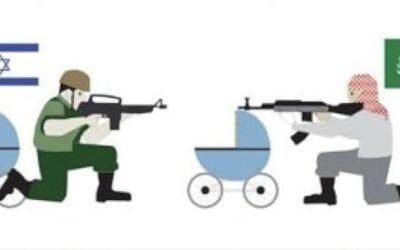Capitalism has been accused of causing many evils: exploitation, pollution, even racism. But perhaps the worst accusation is that capitalism causes war. Capitalism is a “system of exploitation,” it goes, and therefore, capitalist countries “conduct [expansionist] wars for capitalists’ plunder and profits…”
The international peace movement has embraced this idea: in protesting wars (as in the past in Vietnam and in Iraq), it has taken the side of dictatorships that initiate them – whether communist, religious, or even military – against freer, capitalist countries.
In the current war between Hamas and Israel, the anti-war protestors are siding with Hamas, the brutal terrorist organization and ruthless ruler of a religious dictatorship in Gaza that keeps the Palestinians in miserable poverty and doesn’t hesitate to sacrifice them (as human shields, suicide bombers, and child soldiers) for its cause: the elimination of Israel and its Jewish population.
According to the protestors’ narrative, Israel is a colonial oppressor that wages war against Palestinians in capitalistic greed for more land and power. This narrative utterly distorts both the nature of capitalism and historical facts.
Unlike economists who don’t acknowledge the moral foundations of laissez-faire capitalism, Ayn Rand defined it in fundamental terms as “a social system based on the recognition of individual rights, in which all property is privately owned.” In such a system, the government’s only role is to protect the rights of its citizens against the initiation of physical force – and never to initiate it itself.
The closest the world, the West in particular, came to capitalism was between 1815 and the World War I, the freest and one of the longest periods of peace with no multi-country wars and unprecedented growth in prosperity.
As Ayn Rand observes, capitalism is the only system that makes peaceful co-existence among people and countries possible:
Laissez-faire capitalism is the only social system based on the recognition of individual rights and, therefore, the only system that bans force from social relationships. By the nature of its basic principles and interests, it is the only system fundamentally opposed to war.
Men who are free to produce, have no incentive to loot; they have nothing to gain from war and a great deal to lose. Ideologically, the principle of individual rights does not permit a man to seek his own livelihood at the point of a gun, inside or outside his country. Economically, wars cost money; in a free economy, where wealth is privately owned, the costs of war come out of the income of private citizens—there is no overblown public treasury to hide that fact—and a citizen cannot hope to recoup his own financial losses (such as taxes or business dislocations or property destruction) by winning the war. Thus his own economic interests are on the side of peace.
In a statist economy, where wealth is “publicly owned,” a citizen has no economic interests to protect by preserving peace—he is only a drop in the common bucket—while war gives him the (fallacious) hope of larger handouts from his master. Ideologically, he is trained to regard men as sacrificial animals; he is one himself; he can have no concept of why foreigners should not be sacrificed on the same public altar for the benefit of the same state.
The trader and the warrior have been fundamental antagonists throughout history. Trade does not flourish on battlefields, factories do not produce under bombardments, profits do not grow on rubble. Capitalism is a society of traders—for which it has been denounced by every would-be gunman who regards trade as “selfish” and conquest as “noble.”
Let those who are actually concerned with peace observe that capitalism gave mankind the longest period of peace in history—a period during which there were no wars involving the entire civilized world—from the end of the Napoleonic wars in 1815 to the outbreak of World War I in 1914.
Capitalism bans the initiation of physical force from human relationships, as the evil that violates individuals’ rights to life, liberty, property, and the pursuit of happiness – the rights that leave them free to think, produce, and trade: to survive and prosper. In free, capitalist countries, the constitutions prevent governments from initiating force on their own citizens and on other countries. Governments are not permitted to start wars; armed forces are only for self-defense.
Amidst the dictatorships and other statist regimes of the Middle East, only Israel is free (mostly, despite the military draft) and thus closest to capitalism: its citizens (including Arabs) have rights that the government protects. It is a free-enterprise nation where people are protected from force and thus prosper through their productivity.
The governments of Israels neighbors, including Hamas in Gaza and the Palestinian Authority in the West Bank, don’t respect the rights of their own people and initiate physical force against them. Most countries in the Middle East are the opposite of capitalism: their people are not free, which squashes their productivity and keeps them in poverty. Think Iran, Saudi-Arabia, Egypt, Jordan, and Lebanon. (Elan Journo’s book, What Justice Demands documents how these countries violate their citizens’ rights, including lashings, imprisonment, and execution for criticizing the government).
Importantly, Israel has not initiated physical force against other countries or governments. As a free, mostly capitalist country, it has prospered by being productive; it has nothing to gain from invading and colonizing its neighbors. It did not start any of the wars it has been involved in. All – including the present war – have been fought in self-defense (including pre-emptive strikes under imminent threats) against the aggression of its neighbors.
Hamas and the Palestinian Authority don’t want a Palestinian nation that is capitalistic: free, enterprising, and prosperous. Because their goal is to destroy Israel, they don’t want to give up their dictatorial powers to condemn their people to poverty and to sacrifice them while channeling the international aid for the elimination of Israel (and pocketing part of it).
Our – and the peace movement’s – failure to recognize Ayn Rand’s crucial identification of individual rights as the defining characteristic of capitalism and essential to a peaceful society is the fundamental reason we continue to have wars. We have failed to understand capitalism as the only system that protects freedom – and human survival and prosperity. Instead, we have rejected it based on the strawman version of exploitation, peddled by capitalism’s opponents at universities, in political arenas, and in the media.
If we really want peace, we must condemn and stop supporting dictatorships and other forms of statism. Instead, we must understand and adopt capitalism and the individual rights it rests on. Given the current state of the world, that is a stretch goal – but striving for it is our only hope.




